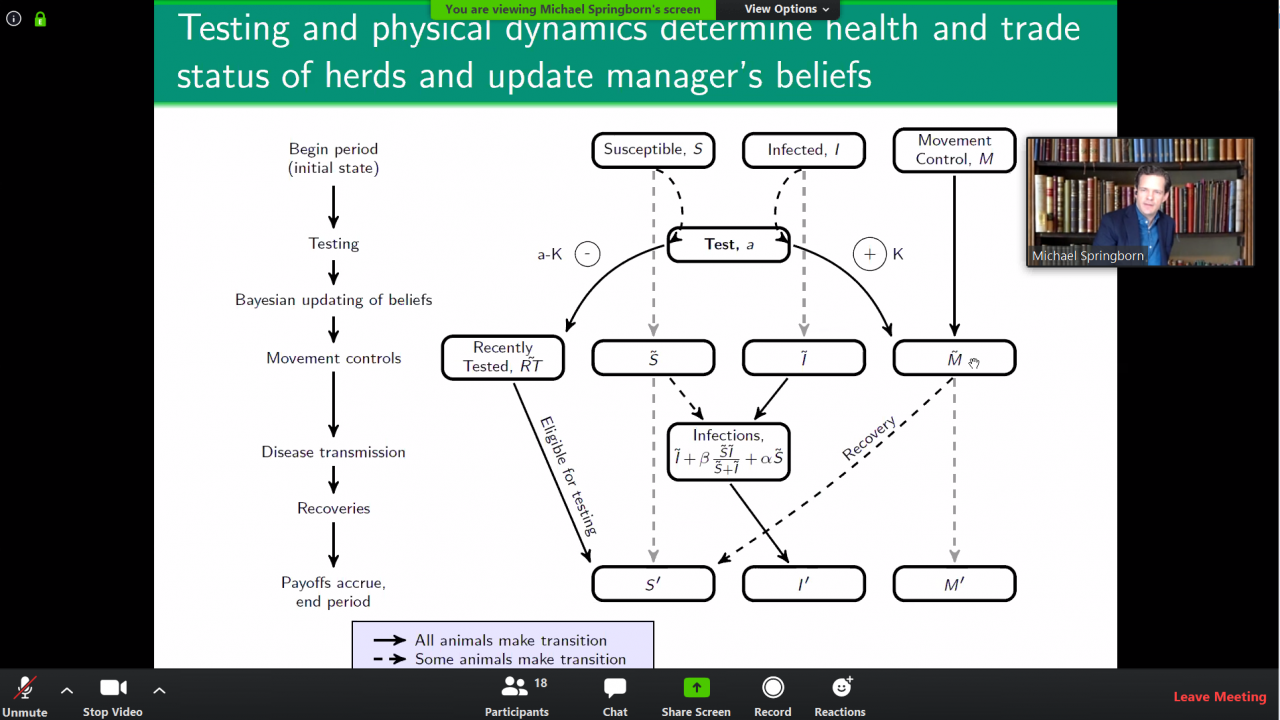
Lab Seminar - Two published papers in the analysis of infectious disease policy with implications for modeling COVID-19
Michael Springborn presented two of his published papers on use of compartmental models in the analysis of infectious disease policy with implications for modeling COVID-19.
Matthew MacLachlan, Michael R. Springborn and Paul Fackler. Learning about a moving target in resource management: Optimal Bayesian disease. American Journal of Agricultural Economics, 99(1), 140-162, 2016.
Resource managers must often make difficult choices in the face of imperfectly observed and dynamically changing systems (e.g., livestock, fisheries, water, and invasive species). A rich set of techniques exists for identifying optimal choices when that uncertainty is assumed to be understood and irreducible. Standard optimization approaches, however, cannot address situations in which reducible uncertainty applies to either system behavior or environmental states. The adaptive management literature overcomes this limitation with tools for optimal learning, but has been limited to highly simplified models with state and action spaces that are discrete and small. We overcome this problem by using a recently developed extension of the Partially Observable Markov Decision Process (POMDP) framework to allow for learning about a continuous state. We illustrate this methodology by exploring optimal control of bovine tuberculosis in New Zealand cattle. Disease testing—the control variable—serves to identify herds for treatment and provides information on prevalence, which is both imperfectly observed and subject to change due to controllable and uncontrollable factors. We find substantial efficiency losses from both ignoring learning (standard stochastic optimization) and from simplifying system dynamics (to facilitate a typical, simple learning model), though the latter effect dominates in our setting. We also find that under an adaptive management approach, simplifying dynamics can lead to a belief trap in which information gathering ceases, beliefs become increasingly inaccurate, and losses abound.
---------------------------------------
Michael R. Springborn, Gerardo Chowell, Matthew MacLachlan, and Eli P. Fenichel, Accounting for Behavioral Responses during a Flu Epidemic Using Home Television Viewing. BMC Infectious Diseases, 15(21), 2015.
Theory suggests that individual behavioral responses impact the spread of flu-like illnesses, but this has been difficult to empirically characterize. Social distancing is an important component of behavioral response, though analyses have been limited by a lack of behavioral data. Our objective is to use media data to characterize social distancing behavior in order to empirically inform explanatory and predictive epidemiological models.